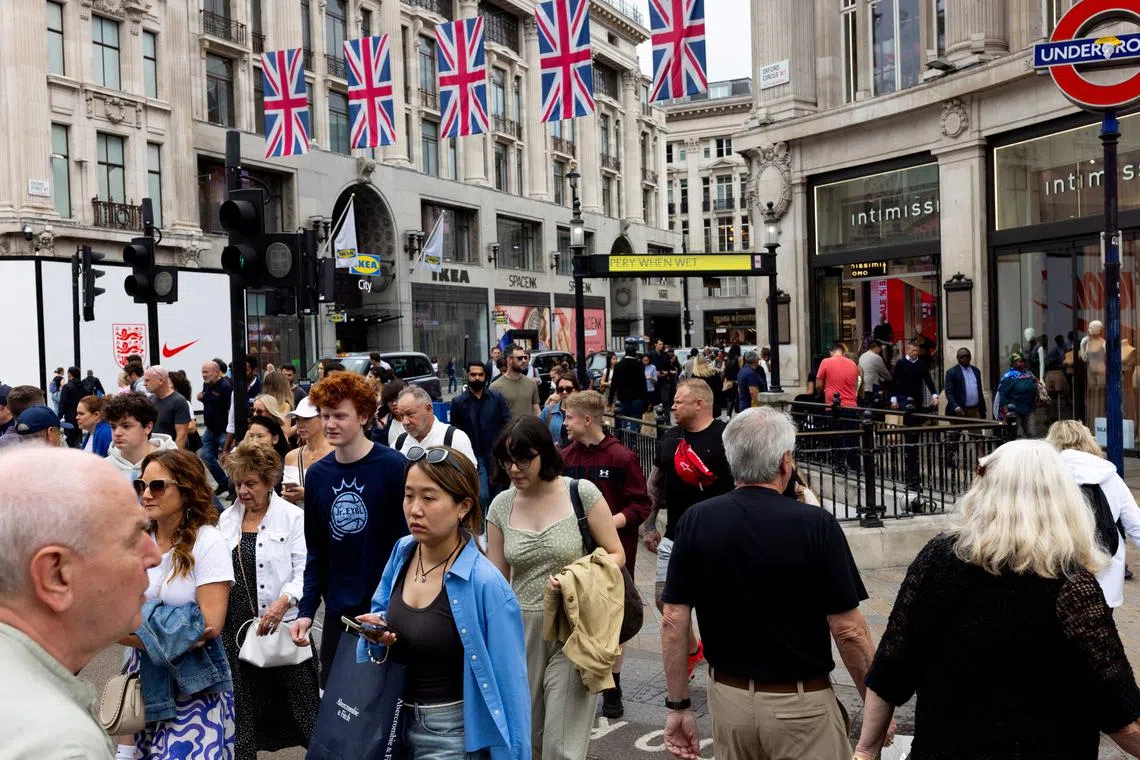UK economy stalls in July as headwinds grow
Sign up now: Get ST's newsletters delivered to your inbox

Consumers are braced for more tax hikes in the Nov 26 budget..
PHOTO: REUTERS
LONDON - The UK economy stagnated in July, marking a tepid start to the third quarter of 2025 as consumers and businesses face headwinds from tax rises with the possibility of more to come at the crucial autumn budget.
Gross domestic product (GDP) was unchanged over the month, a slowdown from the 0.4 per cent growth in June, the Office for National Statistics (ONS) said on Sept 12.
It was in line with the median forecast of economists surveyed by Bloomberg. Services barely grew and manufacturing plunged.
The figures provide a reality check for the Labour administration that is banking on strong growth numbers to help it navigate a tight fiscal situation and meet its promise to improve living standards.
“The stagnation in real GDP in July shows that the economy is still struggling to gain decent momentum in the face of the drag from previous hikes in taxes and possible further tax rises to come in the budget,” said Mr Paul Dales, chief UK economist at Capital Economics.
The economy grew more than 1 per cent in the first six months of the year, allowing Prime Minister Keir Starmer to claim Labour was delivering the fastest growth among Group of Seven major industrial economies as pledged.
However, companies are under pressure from increases to payroll taxes and the minimum wage, while consumers are bracing themselves for more tax hikes in the Nov 26 budget to fill a fresh multibillion-pound hole in Finance Minister Rachel Reeves’ fiscal plans.
Bank of England (BOE) officials believe the underlying picture is subdued and remain concerned over a weakening labour market.
Private-sector economists expect a more pedestrian growth rate in the second half, though Britain is nonetheless expected to grow faster than its major European peers.
The ONS said the powerhouse services sector grew 0.1 per cent in July and construction expanded 0.2 per cent, offsetting a 0.9 per cent slump in production.
However, consumer-facing services were flat despite a pick-up in retail sales.
Manufacturing dropped 1.3 per cent, the most since July 2024, with computers, electronics and pharmaceuticals leading a broad-based decline across the sector.
GDP increased 0.2 per cent in the three months through July, suggesting that momentum in the economy has eased.
“Growth in the economy as a whole continued to slow over the last three months,” said Ms Liz McKeown, ONS director of economic statistics. “Within services, health, computer programming and office support services all performed well, while the falls in production were driven by broad-based weakness across manufacturing industries.”
Ms Yael Selfin, chief economist at KPMG UK, said the weak start to the third quarter is a sign of things to come.
“Economic activity is expected to slow in the second half of the year as the temporary factors which pushed up growth in the first half of 2025 begin to fade,” she said. “The later date of the autumn budget could prolong some uncertainties for businesses.”
Ms Reeves needs stronger growth to help her shore up a tight fiscal situation and meet demands for higher spending on public services. She is facing a budget black hole because of higher interest costs and expectations the fiscal watchdog will downgrade its optimistic growth projections.
The economy still faces multiple headwinds, including sticky inflation, elevated interest rates and deep caution among households.
The BOE expects growth of 1.25 per cent in 2025 and 2026.
Goods exports to the US recovered slightly in July, increasing by £800 million (S$1.4 billion) compared with the previous month on the back of a pick-up in chemicals, machinery and transport equipment, the ONS said. The volume of goods exports remains below the White House launched its Liberation Day tariffs in April. Imports from the US also fell in July.
Britain’s overall trade deficit widened by £400 million in the three months to July to £10.3 billion, as an increase in goods imports particularly from the European Union was only partially offset by a larger surplus in UK services exports. BLOOMBERG


